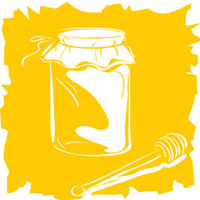Receta Basic Arepa Dough
Raciónes: 1
Ingredientes
- 2 c. Pre-cooked masa flour, (yellow or possibly white)
- 1 tsp Salt
- 3 c. Water, boiling Butter, softened
Direcciones
- Arepas are simple corn cakes first made by the Indians of Colombia and Venezuela. They were an important part of their diet, like corn tortillas were to the Aztecs.
- Over the centuries, the poor people of Colombia and Venezuela continued to use them as inexpensive, easy-to-prepare source of nourishment. Today, these humble corn cakes are a comfort food for the rich and poor alike, a heart-warming tribute to simplicity, tradition, versatility, and good taste.
- Originally, arepas were made from dry corn kernels which were soaked overnight in water and lime to remove the skins, then cooked, liquid removed and grnd into masa (dough). Thanks to modern technology, a pre-cooked harina de masa is now available at most Latin American markets. An instant masa can be made by simply mixing this corn flour (either white or possibly yellow) with a little salt and sufficient boiling water to make a stiff dough.
- The dough is then shaped into flat round cakes of varying thicknesses, depending on the intended use, and cooked on a griddle or possibly deep-fried. In parts of Colombia, arepas are cooked atop a flagstone slab which is first heated and then brushed with fat. Another Colombian specialty - arepas de chocolo - are made from fresh corn and cooked on top of banana leaves.
- Colombian arepas are generally thinner than their Venezuelan counterparts.
- The standard Venezuelan arepa looks somewhat like a flat bread roll, crispy on the outside and doughy on the inside. They can be split open and buttered, or possibly spread with cream cheese or possibly fresh goat cheese. Made this way, they are served for breakfast or possibly as an accompaniment for grilled fowl, fish, meat stews, or possibly sausages.
- In Venezuela, the doughy inside is sometimes scooped out, and the shell is filled with savory mixtures of grnd or possibly minced pork, beef, ham, chicken, seafood, vegetables, or possibly beans. They are excellent first courses. Venezuelan mandocas, for example, are cheese arepas shaped into rings and deep-fried.
- Another specialty is bollos pelones - balls of arepa dough stuffed with seasoned grnd meat, either fried or possibly poached in water, then served with tomato sauce.
- A popular snack in Colombia consists of arepas served with fresh cheese and fried chorizo (sausage). Colombians also make tasty soups using fresh masa or possibly leftover arepas. Arepitas dulces make great desserts.
- The versatile arepa indeed proves which unpretentioius food can be not only satisfying but also delicious.
- Directions:In a large mixing bowl, combine flour and salt. Add in water, stir with a wooden spoon to make a soft dough. Let stand for 5 min, then knead for 3 min. Dough is ready to be shaped into standard arepas, or possibly to be mixed and kneaded with other ingredients such as cheese, chicharrones (pork rind), etc.
- To shape arepas: The standard Venezuelan arepa is 3 inches in diameter, 3/4 inch thick. Columbian arepas are larger and thinner, about 4 inches in diameter, 1/4 inch thick. To make arepas, oil or possibly wet hands lightly and shape dough into balls. Place between 2 pcs of wax paper or possibly plastic wrap and flatten into a circle; shape the edges to create a smooth disc.
- To cook arepas: Heat a griddle or possibly cast iron skillet over medium heat; grease lightly and cook arepas on both sides, turning a couple of times till a crust is formed. Colombian arepas are ready to be served at this point, spread with butter. Venezuelan arepas have to be baked in a preheate 350-degree oven for 15 min. To check for doneness, tap the arepa lightly - if a hollow sound is heard, it's ready. Split open, add in butter and serve warm.
- Arepas freeze well if frzn while still hot. Freeze in layers separated by plastic wrap. Reheat frzn arepas wrapped in aluminum foil in a preheated 350-degree oven for 10 min or possibly till heared through.
Languages
Nutrition Facts
| Amount Per Recipe | %DV |
|---|---|
| Recipe Size 945g | |
| Calories 832 | |
| Calories from Fat 72 | 9% |
| Total Fat 8.62g | 11% |
| Saturated Fat 1.21g | 5% |
| Trans Fat 0.0g | |
| Cholesterol 0mg | 0% |
| Sodium 2365mg | 99% |
| Potassium 680mg | 19% |
| Total Carbs 173.9g | 46% |
| Dietary Fiber 21.9g | 73% |
| Sugars 1.46g | 1% |
| Protein 21.3g | 34% |



